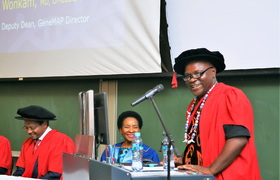Millions of new variants in African genomes discovered
05 November 2020 | Story Nobhongo Gxolo. Photo Getty Images. Voice Lerato Molale. Read time 6 min.
An estimated three million novel genetic variants in over 300 genomes have been discovered through a new, large-scale African collaboration between researchers from the Human Heredity and Health in Africa (H3Africa) consortium, which includes academics from the University of Cape Town (UCT).
A paper on the study, titled “High-depth African genomes inform human migration and health”, was published in the distinguished journal Nature on 28 October.
The abstract starts with the following statement: “The African continent is regarded as the cradle of modern humans, and African genomes contain more genetic variation than those from any other continent, yet only a fraction of the genetic diversity among African individuals has been surveyed.”
“We need a better understanding of Africans to enable research on the genetic basis of diseases in these populations.”
The breadth of this study allows an opportunity to fill in some of the gaps that were previously overlooked, by sequencing genomes of samples from populations not yet represented.
“We need a better understanding of Africans to enable research on the genetic basis of diseases in these populations,” said Professor Nicola Mulder who leads H3ABioNet, a pan-African bioinformatics network for H3Africa.
African research, by Africans
The H3Africa consortium facilitates fundamental research into diseases on the continent and has over 500 members across Africa, with several belonging to groups within the Institute of Infectious Disease and Molecular Medicine (IDM) at UCTʼs Faculty of Health Sciences.
The consortium develops infrastructure, resources, training and ethical guidelines to support a sustainable African research enterprise – led by African scientists, for Africans.
This new study offered H3Africa an opportunity to get involved with work aligned to its mandate, particularly because the global representation of African genomic data remains poor, with international projects often just sampling a few African populations for sequencing.
“African genomes have many novel variants and therefore have a lot to contribute to the global understanding of population genetics.”
This is an unfortunate oversight considering that African genomes have many novel variants and therefore have a lot to contribute to the global understanding of population genetics.
The study is a move towards remedying the lack of representation of populations that are not usually the subject of much coverage. These factors are significant as they enable a more detailed study of the genetic landscape of African populations, which are very diverse.
Professor Mulder, who is a full member of the IDM and also heads the computational biology division in the Department of Integrative Biomedical Sciences in UCT’s Faculty of Health Sciences, is passionate about building capacity to enable African scientists to analyse data garnered from research conducted on the continent.
“This project was a good demonstration of putting this into practice,” she said.
Whole genome sequencing of 426 individuals from 13 African countries was carried out, of which 314 were analysed at high depth. This allowed the researchers to examine rare genetic variants in an accurate and quantifiable way.
Together with collaborators, Mulder’s team applied expertise in the processing of large-scale human genome sequence data and the analysis and interpretation of variants. Their findings indicated extensive genomic diversity among these genomes, even within countries and regions, with unique variants identified in each ethnolinguistic group.
“This reflects the long history and rich genomic diversity across Africa, and suggests enormous scope for identifying novel variants with additional sequencing,” said Mulder.
Ancient migration events unearthed
Apart from the volume of genetic variation discovered between the groups that were studied, while also spotlighting under-represented regions, the research revealed some historical migration patterns across the continent that the team was able to map.
The authors examined common and rare genetic variants to investigate human migration history and to look at regions undergoing natural selection. Many of the regions under selection were associated with genes related to immunity and response to infectious diseases.
“These findings are extremely informative for understanding the frequency of many genetic traits and their links to infectious disease.”
According to Associate Professor Emile Chimusa, from the Faculty of Health Sciences’ Division of Human Genetics and an associate member of the IDM, who worked on the selection section of the paper, the study shows that functionally important genetic variants associated with physiological traits are highly relevant to infectious diseases, and geographically restricted to the local adaptation of a particular lifestyle or environment.
“These findings are extremely informative for understanding the frequency of many genetic traits and their links to infectious disease, including those that cause disease susceptibility or resistance among African populations and populations of recent African descent,” he said.
This data helped them examine historic patterns and pinpoint migration events that were previously unknown.
It also showed evidence of migration from East Africa to a region in central Nigeria 50 to 70 generations ago, which differs from previous reports of gene flow between East and West Africa.
Clinical signficance
“In addition, the study looked at medically relevant variants, and we found that some variants previously characterised as pathogenic were common in some populations. This demonstrates how novel African data can help to reannotate the clinical significance of variants,” said Mulder, who co-leads the Data Integration Platform for the Wellcome Centre for Infectious Diseases Research in Africa (CIDRI-Africa).
The findings have broad relevance, providing new insights into human history and migrations and providing data for population genetics and health-related research.
The collaboration was between just under 20 institutions around the continent, all including members from H3Africa. While previous African studies have mostly been led by people outside of the continent, this study was driven by African scientists.
“[This demonstrates] the recent growth in infrastructure and resources, as well as the necessary skills in Africa to undertake generational analysis and interpretation of large-scale genomics,” Mulder said.
 This work is licensed under a Creative Commons Attribution-NoDerivatives 4.0 International License.
This work is licensed under a Creative Commons Attribution-NoDerivatives 4.0 International License.
Please view the republishing articles page for more information.










